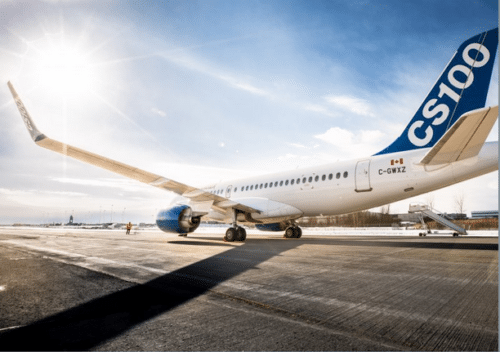
Bombardier C Series aircraft. Photo courtesy of Bombardier
Airbus said Monday that it will acquire a 50% stake in Bombardier’s C Series program, which will potentially have major implications across the commercial aviation industry.
Under the agreement, Airbus will provide “procurement, sales and marketing, and customer support expertise” to the C Series Aircraft Limited Partnership (CSALP). The primary assembly line for the C Series would remain in Quebec, with Airbus expanding additional C Series production to the manufacturing site it opened in Alabama last year.
How the French OEM ultimately came into the agreement with Bombardier is complicated, but it would resolve a major outstanding issue that Bombardier is facing trying to sell its regional jet to airlines based in the U.S.
In September, the U.S. Commerce Department’s International Trade Commission made a preliminary recommendation to impose a 219.63% tariff on every C Series delivery. The Commerce Department followed that up Oct. 5 affirming its decision, noting that it believes Bombardier is in violation of a U.S. anti-dumping duty law. According to the department, that law is defined as providing “U.S. businesses and workers with a transparent, quasi-judicial and internationally accepted mechanism to seek relief from the market-distorting effects caused by injurious dumping of imports into the United States, establishing an opportunity to compete on a level playing field.”
Boeing petitioned for a lawsuit against Bombardier, which lead to the ultimate decision by the Commerce Department, because the U.S.-based OEM felt that Bombardier was selling the C Series at below market value and received illegal government financial assistance in manufacturing it. That decision would have a major impact on Bombardier’s ability to fulfill a 2016 order estimated to be worth $5 billion from Delta Air Lines for 75 CS100s. The Canadian OEM spent an estimated $6 billion on development of the C Series, which entered into service last year with SWISS Airlines. On Tuesday, Oct. 17, Boeing tweeted its expectation for “duties” levied against C Series imports to be 300%. A final decision on the import tariff against the C Series is expected to occur in 2018.
However, if the Airbus-Bombardier partnership clears regulatory approvals, Airbus would add a C Series production line to its manufacturing facility in Alabama, potentially allowing Bombardier to avoid the tariff.
“Airbus is the perfect partner for us, Québec and Canada,” said Alain Bellemare, president and CEO of Bombardier. “Its global scale, strong customer relationships and operational expertise are key ingredients for unleashing the full value of the C Series. This partnership should more than double the value of the C Series program.”
If the Airbus-Bombardier partnership is approved, it would be the latest occurrence in a series of events that have impacted the production and entry into service of the C Series in recent years. In September 2016, for example, Bombardier said it would only be able to complete half of the scheduled C Series deliveries for the year due to production ramp up delays by Pratt & Whitney, which manufactures the C Series geared turbofan engines.
Bombardier is projecting global demand for 6,000 new aircraft within the C Series 100- to 150-seat segment over the next two decades.
Though the partnership has been approved by the boards of directors of both Airbus and Bombardier, as well as the cabinet of the government of Quebec, it remains subject to regulatory approvals and is expected to close by the second half of 2018.